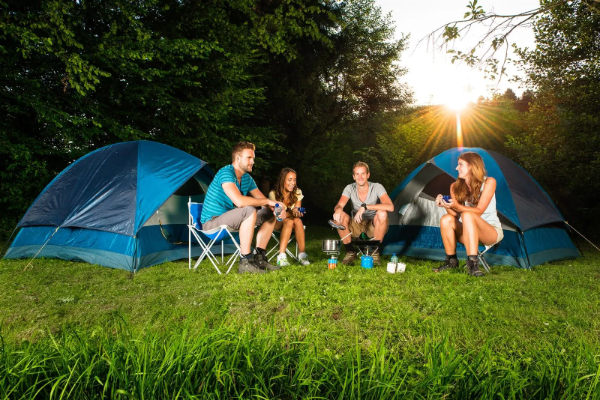Planning a family camping trip can be an exciting adventure, but it requires careful preparation to ensure everyone has a safe and enjoyable experience. One of the most critical aspects of trip planning is packing. This article will guide you through the essential items to pack, considerations for your family’s specific needs, and additional tips to make your camping trip successful.
Essential Categories
Shelter: Tent, Sleeping Bags, Sleeping Pads, Pillows, Groundsheet
Your shelter is the foundation of your camping experience. A reliable tent that comfortably fits your family is a must.
Choose a tent that offers adequate space and is easy to set up. Sleeping bags should be suitable for the climate of your camping destination, ensuring warmth during colder nights. Complement sleeping bags with sleeping pads for added comfort and insulation from the ground. Don’t forget pillows for a good night’s rest. A groundsheet is essential to protect the bottom of your tent from moisture and abrasions, extending its lifespan.
Cooking & Food
Cooking outdoors is a big part of the camping experience. A portable stove with sufficient fuel is essential for cooking meals. Ensure you pack lightweight and durable cookware, including pots, pans, and utensils. Don’t forget a food storage solution, such as a cooler or bear-proof container, to keep your meals fresh and safe from wildlife. Plan your meals ahead of time, and pack all the necessary food items, including snacks and beverages. Consider easy-to-prepare meals that require minimal cooking and cleanup.
Clothing & Footwear
Pack clothing that is appropriate for the weather conditions you’ll encounter. Layering is key, as temperatures can fluctuate throughout the day. Bring rain gear, hats, and gloves to be prepared for any weather. Comfortable hiking shoes are essential for exploring trails, and swimwear is a must if you plan to enjoy any water activities. Don’t forget extra socks and underwear to stay dry and comfortable.
First Aid & Safety
Safety should always be a top priority. A well-stocked first aid kit is essential for treating minor injuries. Include bandages, antiseptic wipes, pain relievers, and any necessary prescription medications. Sunscreen and bug spray are crucial for protecting your family from the elements. A flashlight and headlamp are necessary for navigating the campsite after dark. Additionally, bring a fire starter, matches, or a lighter to safely start campfires for warmth and cooking.
Hygiene & Comfort
Maintaining hygiene while camping is important for comfort and health. Pack toiletries such as toothbrushes, toothpaste, and deodorant. Hand sanitizer and wet wipes are handy for quick clean-ups. Use biodegradable soap to wash dishes and clean up after meals without harming the environment. A quick-drying towel is useful for drying off after swimming or washing. Trash bags are essential for keeping your campsite clean and packing out all your waste.
Entertainment & Activities
While the great outdoors offers plenty of entertainment, bringing along a few activities can enhance your family camping experience. Pack board games, cards, and books for downtime at the campsite. Binoculars and a camera are great for wildlife watching and capturing memories. Hiking gear, such as walking sticks and backpacks, is essential for exploring trails. If your campsite has water access, swimming gear like goggles and floaties will keep the kids entertained.
Family-Specific Considerations
Children’s Needs: Diapers, Wipes, Formula, Toys, Kid-Friendly Snacks
Pet Needs: Food, Water Bowls, Leash, Carrier, Pet First Aid Kit
If your furry friends are joining the adventure, make sure to pack all their essentials. Bring enough pet food and water, along with bowls for feeding. A leash is necessary for keeping your pet safe, and a carrier may be useful for travel. A pet-specific first aid kit can be invaluable in case of an emergency.
Camping Experience Level
Your family’s camping experience level will influence the type of gear you bring. For beginners, focus on easy-to-use, all-in-one kits that simplify setup and cooking. Experienced campers might prefer more specialized gear tailored to their needs and preferences.
SEE ALSO: How Much do you Know about Pregnancy Camping Chairs?
Additional Tips & Advice
Packing Strategies: Lightweight Options, Space-Saving Techniques
Efficient packing is key to a successful camping trip. Choose lightweight gear whenever possible and use space-saving techniques like rolling clothes instead of folding them. Compressible sleeping bags and collapsible cookware can save valuable space.
Preparation Before the Trip
Pre-planning meals can save time and stress at the campsite. Prepare and pack snacks and meals in advance, focusing on items that travel well and require minimal preparation. Before packing, check the condition of your gear to ensure everything is in working order.
Packing Checklist
A packing checklist is an invaluable tool to ensure you don’t forget any essentials. Create a detailed, category-based checklist that you can print out and use as you pack.
Conclusion
Packing for a family camping trip involves more than just throwing a few items in a bag. By following these guidelines, you’ll be well-prepared for any situation that arises, ensuring a fun, safe, and memorable camping adventure for your entire family.

